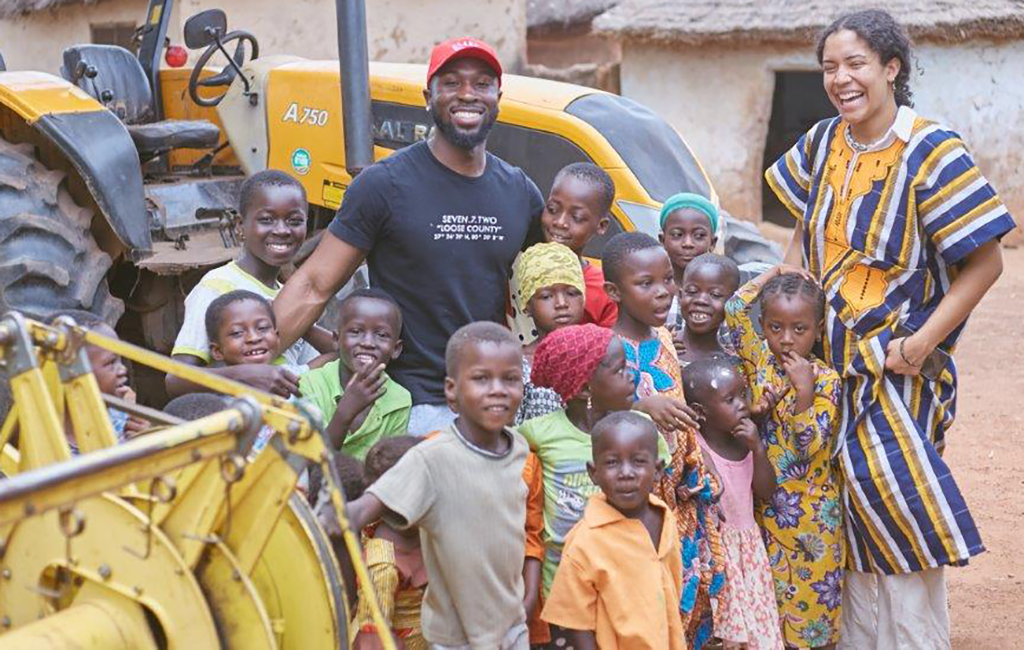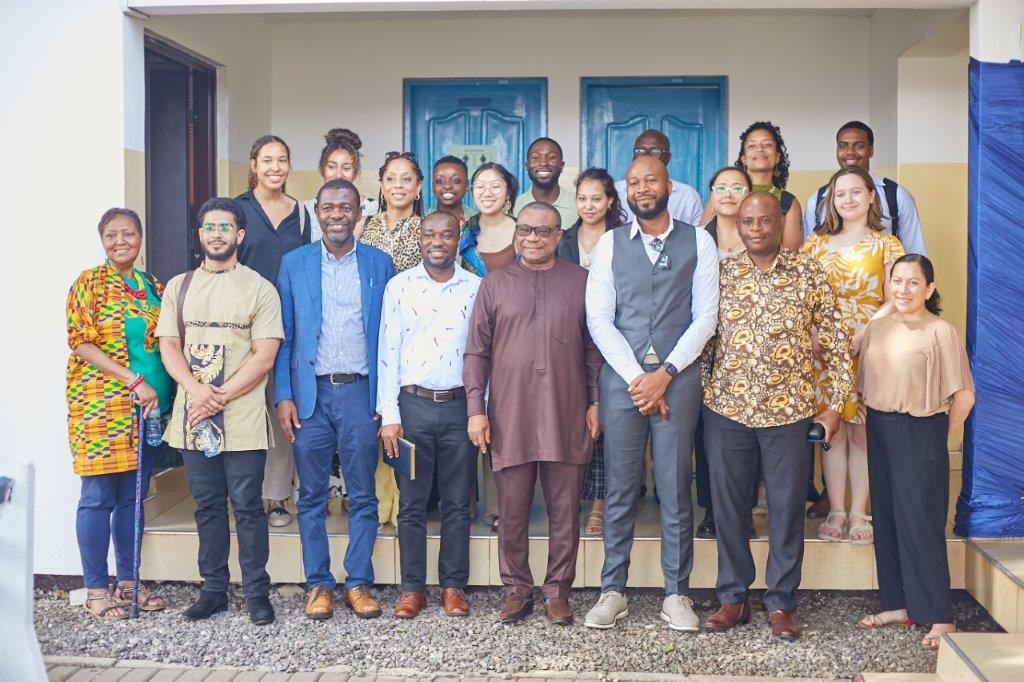Ghana trip evokes reflections on heritage, history, and identity

When he was a student at Clark, it seemed that everyone knew Biko Gayman — and with good reason. He was a star player on the men’s basketball team, an accomplished student, and a fellow with Clark’s Mosakowski Institute for Public Enterprise, where he worked to increase awareness of the mental health challenges faced by young men of color.
Despite being called Biko for most of his life, his full name is Dyujae Bantu Biko Gayman, reflecting his father’s heritage as a native of Liberia. But “Biko” was more easily pronounced and remembered, so using it became a practical consideration.
Gayman is now embracing his given name of Dyugae after recently accompanying a group from Clark led by Kamaro Abubakar, associate dean for student success-community living, to Abubakar’s home country of Ghana.
“Being in Ghana made me appreciate my name more; made me more confident with who I am,” Gayman says. “I understand why my father gave me this name, and I appreciate my West African heritage.”
Abubakar organized the Ghana trip to give the participants an experience of “cultural immersion,” something that he’d experienced when he immigrated to the United States in 2004. He lived in the Bronx for years before attending the University of Vermont — an experience, he says, that “helped me understand who I am as a Black person in America.”
While still a student, Abubakar became intrigued by those who mistakenly assume that African immigrants to the United States necessarily share the same set of experiences as African Americans. How these two groups are distinct, how they interrelate, and how they live with common misconceptions remained a source of curiosity for him — so much so that he made it the central theme of his doctoral dissertation.
“When I first came to the United States, I had challenges with people who, based on what I looked like, expected me to think and act a certain way,” he recalls. “I didn’t have the same experiences with race and racism as African Americans, and I wanted to explore the stereotypes surrounding both groups.”
His ongoing fascination with this cultural divide — and desire to bridge it — inspired Abubakar to organize the Ghana excursion as a way to immerse Clark students in an unfamiliar setting “to learn about it, but also to figure out who we are.”
 With the assistance of Mosakowski Institute Director Nadia Ward, he formalized his vision for the trip and enlisted Mosakowski student fellows to help create an application process and interview students interested in participating. During spring break last month, 11 students and alumni, along with Margo Foreman, vice president of diversity, equity, and inclusion; Kathy Esparza from the Mosakowski Institute; and Ward joined Abubakar in Ghana, where he’d flown ahead to make arrangements.
With the assistance of Mosakowski Institute Director Nadia Ward, he formalized his vision for the trip and enlisted Mosakowski student fellows to help create an application process and interview students interested in participating. During spring break last month, 11 students and alumni, along with Margo Foreman, vice president of diversity, equity, and inclusion; Kathy Esparza from the Mosakowski Institute; and Ward joined Abubakar in Ghana, where he’d flown ahead to make arrangements.
The travelers were greeted at the airport with traditional dance and music, and then embarked on 10 days of discovery, learning, and sharing with the people of Ghana. They met with educational, political, and business leaders, as well as with fellow students; explored a wild animal preserve; and visited a school in the northern part of Ghana, where, with Clark’s financial backing, he was able to secure a donation of 100 much-needed school desks. At every step, Abubakar notes, participants were able to build a cross-cultural understanding with their hosts, exploring differences and identifying areas of commonality.
Memorable touchpoints were visits to Elmina Castle and Cape Coast Castle, former strongholds for the West African slave trade. Captured Africans were brought to these coastal fortresses, where they were imprisoned and forced onto boats to begin their torturous oceanic journey.
Kennedy Messado, a sophomore psychology major from Kingston, Jamaica, who is a fellow at the Mosakowski Institute, found the Elmina visit particularly wrenching. Jamaica and Ghana have a long, entwined history, she says, with many enslaved Ghanaians sent to work in the Jamaican sugarcane fields.
“We’ve learned about the struggles, but at the castle where they punished the slaves you could feel the suffocation and the pain. That was unexpected,” she says. “I’m not a crier, but I shed a lot of tears that day.”
Like Abubakar, Messado felt a personal disconnect coming to the U.S. to study, noting that Jamaicans don’t share the same cultural and historical narrative as African Americans, and she has sought to better understand and acknowledge differing perspectives. Messado worked to achieve similar awareness in Ghana, where she and the Clark group navigated an unfamiliar culture. Conversations with university students in Ghana revealed an intense interest in the U.S. and specifically in Worcester, because of its large Ghanaian population, she adds.
Jasmin Blanco-Zapata, a junior from Westchester, New York, described the “effortless” conversations with her peers in Ghana. “There was genuine curiosity about what it’s like to go to school in the United States, and we were curious about their institutions and their daily lives.”
She says the trip gave her deeper insight and appreciation for her parents, who grew up in Honduras and who, like Abubakar, had to readily adjust to an entirely new way of life when they immigrated to the U.S. “This really helped me to value their experience,” she says.
Of the students they encountered, many were studying environmental science with a singular goal. Their intention “was to make sure their community had clean water,” Blanco-Zapata says.
Abubakar said he wants to extend this experience in several ways.
“I’m interested in what we can bring back to the Clark and Worcester communities through this,” he says. “How are we connecting to the community we’re in? How can we learn about the differences between the two places and build mutual understanding?”
He says his ultimate goal is to make Ghana a regular destination for the University’s Study Abroad program.
At this year’s ClarkFEST, on April 26, all of the students who made the Ghana trip will reflect on their experience through a poster presentation and show a short video capturing the highlights. In addition to Gayman, Messado, and Blanco-Zapata, student and alumni participants were Clarissa Ko ’25, Andy Acevedo ’23, Sofia Bishop ’23, Leyla Knight ’24, Jamuna Prajapati, M.S. ’24, Rajita Madhikarmi, M.S. ’23, Gralen Vereen ’22, and Chloe Jacobs ’26.
Gayman, who earned his undergraduate degree in 2021 and a master’s in community and global health last year, said the trip challenged his own long-held views about Africa and also allowed him to address some of their host’s misperceptions about the U.S.
“At the end of the trip, we sat with two boys who shared how they viewed us, and everything they described was from movies and social media — that we are all super masculine and aggressive,” he smiles. “When they met me, Gralen [Vereen], and Andy [Acevedo], they thought this is how we are, and did not expect us to be totally opposite of that.
“It was an intense experience to learn about the community and their daily lives. They expressed so much joy. I remember thinking that this was my father’s reality, and now I’m seeing the continent of Africa for the first time. Every day offered something mind-blowing.”


